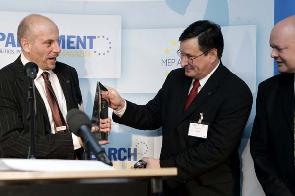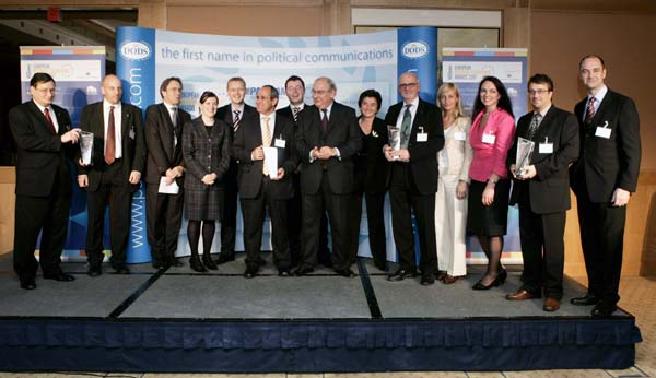Press release
HELCOM Baltic recovery plan wins European Regional Champions Award

Brussels, 29 November (HELCOM Information Service) – The overarching HELCOM Baltic Sea Action Plan to drastically reduce pollution to the Baltic Sea and restore its good ecological status by 2021 has received the European Regional Champions Award 2007 in the environment category. This award has been developed to showcase and celebrate the very best in regional innovation and examples of best practice throughout EU regions in 10 different categories. The winners of the inaugural European Regional Champions Awards, hosted by Brussels magazine Regional Review in association with the European Union’s Committee of the Regions (CoR), were unveiled at a ceremony attended by CoR President Michel Delebarre in Brussels on 27 November.
“We feel honored by this award recognizing our Baltic Sea Action Plan as an outstanding example of innovative projects developed by a regional marine convention,” says Anne Christine Brusendorff, Executive Secretary of HELCOM. “In fact, our ambitious but very pragmatic programme of actions to restore the health of the sea by 2021, which the HELCOM member states adopted two weeks ago, is the first attempt by a regional marine protection convention to implement the ecosystem approach defined by the 1992 Rio Declaration and the 2002 World Summit on Sustainable Development in Johannesburg. It will lead to profound, innovative changes in the ways the coastal countries manage the environment in the Baltic Sea region. The plan will be a crucial stepping stone for wider and more efficient actions to combat the continued deterioration of the marine environment resulting from human activities. With the creation of the new environmental strategy, HELCOM will continue its long record of respected leadership in marine environmental protection.”

The revolutionary aspect of the new plan is that it will be based on a clear set of Ecological Objectives defined to reflect a jointly agreed vision of a healthy Baltic Sea. Example objectives include clear water, an end to excessive algal blooms, and viable populations of species. Targets for good ecological status will be based on the best available scientific knowledge. With the ecosystem approach, the protection of the marine environment is no longer seen as an event-driven pollution reduction approach to be taken sector-by-sector. Instead, the starting point is the ecosystem itself, and a shared concept of a healthy sea with a good ecological status. This vision determines the needs for reductions in pollution loads, as well as the extents of various human activities.
The plan is designed to solve all major environmental problems affecting the Baltic Sea. It contains concrete and meaningful actions to curb eutrophication, prevent pollution involving hazardous substances, improve maritime safety and accident response capacity, and halt habitat destruction and the decline in biodiversity.
The concept of the HELCOM Baltic Sea Action Plan has already been widely supported by politicians at various forums, and heralded as a pilot project for European seas in the context of the proposed EU Marine Strategy Directive. The European Community has described HELCOM’s plan as a cornerstone for further action in the Baltic Sea region, emphasizing that the plan is instrumental to the successful implementation of the proposed EU Marine Strategy Directive in the region.
The proposed EU Marine Strategy Directive foresees such an action plan for each eco-region, including the Baltic. HELCOM is in a unique position to deliver this already, given its embracing of all the countries in the Baltic Sea catchment area. HELCOM is also in a unique position to ensure that the special characteristics of the Baltic Sea are fully accounted for in European policies. As a pioneer in the application of the ecosystem approach, the innovative HELCOM action plan will also serve as a model example to be followed by the Regional Seas Conventions and Action Plans under the auspices of the United Nations Environmental Programme Regional Seas Programme.
“Different seas often require tailor made solutions and it is very important that global, European and regional policies complement each other,” says Brusendorff. “It is also important to realize that integrated management of human activities requires due consideration of environmental aspects when developing and implementing various policies and programmes in the regions. Thus, common regional knowledge and priorities, as identified by marine cooperation programmes, HELCOM being one of them, should be utilized in policy making at the global, European, regional and national level. HELCOM finds it important to support sharing of experience between regions so best practices and models from one region can be replicated to other regions.”
Note to Editors:
The Baltic Marine Environment Protection Commission, more commonly as the Helsinki Commission or HELCOM, is an intergovernmental organization of all the nine Baltic Sea countries and the European Community working to protect the marine environment of the Baltic Sea from all sources of pollution and to ensure safety of navigation.
HELCOM is the governing body of the "Convention on the Protection of the Marine Environment of the Baltic Sea Area," also known as the Helsinki Convention.
For details on the HELCOM Baltic Sea Action, please visit the following page http://www.helcom.fi/BSAP/en_GB/intro/.
Also see EU CoR press release http://cor.europa.eu/en/press/press_07_11142.html , photo gallery http://cor.europa.eu/photo_gallery/Eur_Reg_Champs_27_11_2007/index.htm , and YouTube http://www.youtube.com/watch?v=kb96bTH1P6Y.
For more information, please contact:
Mr. Nikolay Vlasov
Information Secretary
HELCOM
Tel: +358 (0)207 412 635
Fax: +358 (0)207 412 639
E-mail: nikolay.vlasov@helcom.fi

